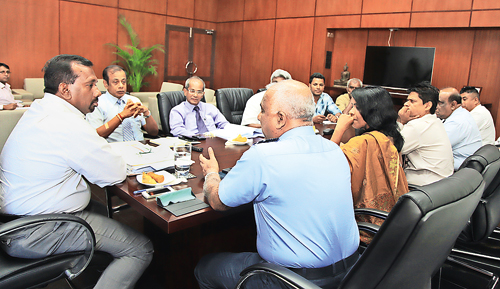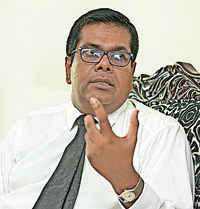Confusion on Sports Law remain unsolved

The regulations of the Sports Law were amended during the years when Mahindananda Aluthgamage was Minister of Sports in 2013
Given the non-intervention approach of international sports bodies in governance, legal experts warn any attempt to introduce a brand new sports law to replace what’s in existence since 1973 will lead to complications.
One of the key priorities of Sports Minister Namal Rajapaksa has been to introduce a new sports law to give more independence to national sports associations and resolve conflict with international laws that govern sports bodies.
“No doubt we need to change some of the intrusive and restrictive clauses in the sports law but I don’t think bringing a completely new law is the right thing to do,” said lawyer Panduka Keerthinanda, who was instrumental in drafting the Prevention of Offenses relating to Sports Act.
“The problem is, if we abolish the existing law, we will never be able to bring those regulations back as some of the international associations like the IOC (International Olympic Committee (IOC), FIFA (World Football body) and ICC (International Cricket Council) want total independence for their member associations,” he explained.
“So the way forward is to bring in amendments to keep politics out of sports, with proper checks and balances.”
In 2013, Sri Lanka agreed in principle to review its archaic sports law to make it compatible with the basic principles that govern the Olympic Movement. But little was done to follow through on recommendations. The IOC has repeatedly warned of repercussions if Sri Lanka failed to introduce changes to minimise political interference, and to safeguard the autonomy and independence of sports associations.
However, after six years of repeated calls by the IOC, Sri Lanka came up with a new amendment that removed some of the major intrusive elements. With the change of Government, the Sports Minister is now keen on revamping it completely and bringing in a new law.
The Sports Act No 25 of 1973 has been amended thrice before. The Sports (Amendment) Act of 47 in 1993 introduced a key legislation forcing all national sports associations to audit their annual accounts through the Government Auditor.
Sports bodies, especially the National Olympic Committee of Sri Lanka (NOCSL), have repeatedly asked for exemption from Government audits. They argued that this causes repeated delays in the holding of annual general meetings owing to the workload of auditors.
“This was a very important amendment that was instituted in 1993,” said Keerthinanda, who has represented Sri Lanka in many discussion with IOC, FIFA and ICC on governance of sports associations.

Legal expert Panduka Keerthinanda has been involved with the amendment from the beginning
“I do not think we should remove it completely as it is a vital check-and-balance. Of course, the existing system has caused delays given the Government auditor’s workload. There are two categories of sports bodies: those funded by the Sports Ministry and those not funded by the Ministry. We should allow those self-funded or funded by their international bodies to be audited by reputed audit firms while others must continue to be audited by the National Audit Office (NAO). This will reduce the workload of the NAO and, in the event of any corruption or malpractice, we can charge them under the Prevention of Offenses relating to Sports Act. If you abolish and implement a new law, the international sports bodies will not allow us to do this because some of these bodies don’t like interference.”
Also the Section 30 and 33 of the sports law allows the Minister of Sports to make interim arrangements to sports bodies in the event of any conflict. Sri Lanka is the only country with such provisions but Keerthinanda said they must stay.
“The Minister should be able to go for interim arrangements in the event of suspension or cancellation of registration but he should do so in consultation with the National Sports Council – a 13-member advisory body – for a specific time period not exceeding six months. The interim committee will have three or five members only,” he explained.
“Right now, ICC or any other international body can’t do anything, because it’s the law of the country. But when you abolish it, they will never be able to bring it back,” he added.
He admitted some ridiculous legislatures like the appointment of selectors by the minister and requiring minister’s approval to national teams should be taken off completely.
Keerthinanda also said that Sports Appeal Committee should be set up leaving no room for the Sports Minister to intervene. They propose fines for members of national sports bodies involved in malpractices, failure to implement policies of the Ministry and failure to comply with the Sports Law.
“We should have an independent sports tribunal to settle any sports related disputes,” he explained.


